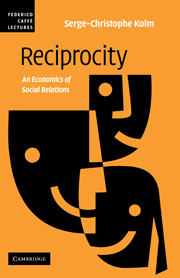Crossref Citations
This Book has been
cited by the following publications. This list is generated based on data provided by Crossref.
Dubois, Jean-Luc
and
Lasida, Elena
2010.
A new style of development to deal with the current crisis: solidarity-based economy, collective capability and sustainable human development.
Revue de philosophie économique,
Vol. Vol. 11,
Issue. 1,
p.
35.
Bruni, Luigino
2010.
Éros, Philia et Agapè..
Revue du MAUSS,
Vol. n° 35,
Issue. 1,
p.
389.
Elster, Jon
2011.
Social Ethics and Normative Economics.
p.
327.
Kolm, Serge-Christophe
2011.
On Kolm's Theory of Macrojustice.
p.
35.
Kolm, Serge-Christophe
2011.
On Kolm's Theory of Macrojustice.
p.
69.
Višňovský, Emil
2011.
The pragmatist conception of altruism and reciprocity.
Human Affairs,
Vol. 21,
Issue. 4,
p.
437.
Karlberg, Michael
2012.
Forming a Culture of Peace.
p.
15.
Roemer, John E.
2012.
ON SEVERAL APPROACHES TO EQUALITY OF OPPORTUNITY.
Economics and Philosophy,
Vol. 28,
Issue. 2,
p.
165.
Göbel, Markus
Vogel, Rick
and
Weber, Christiana
2013.
Management Research on Reciprocity: A Review of the Literature.
Business Research,
Vol. 6,
Issue. 1,
p.
34.
Randrianasolo, Hanitra
and
Dubois, Jean Luc
2014.
The Capability Approach.
p.
231.
Eleftheriadis, Pavlos
2014.
The Content of European Citizenship.
German Law Journal,
Vol. 15,
Issue. 5,
p.
777.
Chomi, Eunice N
Mujinja, Phares GM
Hansen, Kristian
Kiwara, Angwara D
and
Enemark, Ulrika
2015.
Household perceptions towards a redistributive policy across health insurance funds in Tanzania.
BMC Health Services Research,
Vol. 15,
Issue. 1,
Hensmans, Manuel
2015.
The Trojan horse mechanism and reciprocal sense-giving to urgent strategic change.
Journal of Organizational Change Management,
Vol. 28,
Issue. 6,
p.
1038.
Sandhu, Sima
Arcidiacono, Eleonora
Aguglia, Eugenio
and
Priebe, Stefan
2015.
Reciprocity in therapeutic relationships: A conceptual review.
International Journal of Mental Health Nursing,
Vol. 24,
Issue. 6,
p.
460.
Mofulu, George
Pan, Ancheng
and
Li, Pengfei
2016.
Indirect reciprocity: Its antecedents and consequences in social entrepreneuring.
Rationality and Society,
Vol. 28,
Issue. 1,
p.
105.
Donovan, James M.
2016.
Bronislaw Malinowski's Concept of Law.
p.
83.
Pinheiro, Rómulo
Normann, Roger
and
Johnsen, Hans Christian Garmann
2016.
External engagement and the academic heartland: The case of a regionally-embedded university.
Science and Public Policy,
p.
scw020.
Verbrugge, Lois M.
and
Ang, Shannon
2018.
Family reciprocity of older Singaporeans.
European Journal of Ageing,
Vol. 15,
Issue. 3,
p.
287.
Marier, Christopher J.
and
Moule, Richard K.
2019.
Feeling Blue: Officer Perceptions of Public Antipathy Predict Police Occupational Norms.
American Journal of Criminal Justice,
Vol. 44,
Issue. 5,
p.
836.
Oliver, Adam
2019.
Reciprocity and the Art of Behavioural Public Policy.



